
Meg Jayanth is a London-based freelance writer and digital producer. She won the UK Writers' Guild award for Best Writing in a Video Game for her work on 2014's acclaimed mobile hit 80 Days, and most recently contributed writing to Failbetter Games' 2015 release Sunless Sea. Follow her on Twitter.
10. Minecraft: Story Mode
I'm a fan of Telltale Games--I've liked some series more than others, of course, depending on their content and approach, and my own tastes. But as a whole their games have expanded the space for narrative and choice-driven games, which is altogether admirable. With Minecraft: Story Mode they're rivaling the magic of The Walking Dead Season 1--my personal favourite, closely followed by Game of Thrones-- but from a comedic rather than dramatic angle.
And it is funny, and charming, and a little silly. It's a knowing family-friendly romp of a game which feels like an adventure. It was an inspired choice to set it in a present-day analogue rather than "ye olde fantasy times"--it makes the mythic adventure feel fresh even when it embraces familiar tropes. In a sea of grimdark, cynicism, and life-and-death stakes, it's sometimes wonderful to play a game brimming with a sense of fun.
9. Cibele
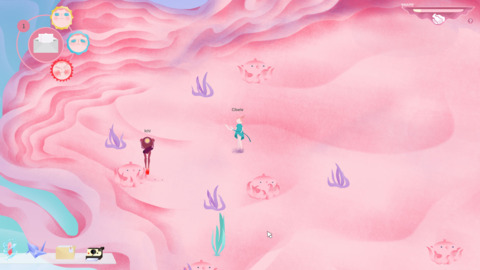
Nina Freeman uses the interface of an online MMO to tell the true story of her first sexual experience: The time she, at 19, fell in love with a boy she played Final Fantasy XI with, and he flew across the country to meet her. In Cibele, Freeman presents a simulacrum of her own computer, full of real youthful selfies, journal entries, and poems, many of them actually kept from that time in her life. Exploring these artifacts made me feel as if I knew young Nina, and gave me a rush of nostalgia. My own experiences growing up online were different, but there's a shared understanding here, a shared vocabulary.
The main arc of Cibele happens in Valtameri, a game-within-a-game whose visual palette is reminiscent of FFXI and other MMOs of its day. You click to cast spells on wicked sprites, but the real reason you're there is to while away hours bonding shyly over voice chat with "Ichi", your guild leader. The audio conversations--in fact, the whole experience of Cibele, assisted by real-world video footage of Freeman herself--felt like a believable record of young love in the digital age and how technology can shape our understanding of intimacy. It's an admirable artistic choice for Freeman to put so much of herself--so honestly--into the work.
8. Dropsy
Lots of people hate clowns, but Dropsy is one to love. This lonesome, damp (?), but optimistic clown stands on the fringes of his strange pastel world, watching and wanting to help--and hug--the humans who fear him. It would be easy for a game like this to trade simply in gross-out humour and creepiness, or indulge unpleasantly in disability jokes (Dropsy is mute and has no hands, just rubber balloon appendages). But there is something so relentlessly pure and sweet about this point and click adventure that it stuck with me all year.
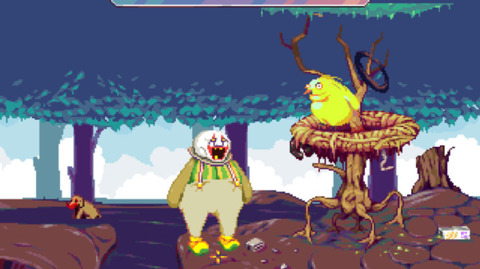
It feels modern for a point-and-click, simple and intuitive to learn and play. The puzzles were engaging, and I felt challenged without ever being frustrated. And the soundtrack by Chris Schlarb is entirely unlike anything I've heard in an adventure game before; it turns "traversing screens" into atmospheric wanderings through a wan, poignant circus-dream.
7. Hornets
Kitty Horrorshow's Hornets begins with the words "it's your fault the world is ending". It's a beautifully creepy Twine game that unfolds as you try and figure out why and how the world ended. And, maybe more pressingly: what did you do?
Probably it has something to do with the giant, blood-drunk hornets crouching menacingly over the smashed ruins of your town. It is an entirely-invented place, but it feels like a real lost artifact, its markets and landmarks strangely believable. The writing is haunting and delicate, and the game is structured to offer a natural sense of exploration and mystery; it was an interesting conceit to play as a character who knows much more than the player about the world and its circumstances, and continued to do so, even once I had reached the end.
6. Prune
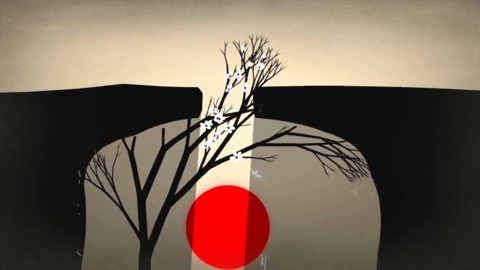
It feels ridiculous to write words about Prune--the best possible recommendation I could give it would be a series of stills captured from the game. But in short: it's a touchscreen game where you swipe to "prune" away branches and errant limbs to allow your tree to grow and blossom. It's minimalist and elegant, both in its art-style and the way the game carefully adds new elements and impediments to keep play challenging.
But it just feels so good--to play, to look at, to listen to. It's so beautiful that the beauty becomes part of its function. Success is marked by a blossoming of flowers and a plinking of notes--but honestly any given moment of play is as aesthetically and meditatively satisfying as "winning".
5. Renowned Explorers: International Society
Renowned Explorers is a highly replayable strategy game of exploration set in the 19th century with a diverse cast of characters and a sprinkling of narrative content, so how could I resist? The game calls its combat "encounters", and for good reason: you can resolve situations through friendliness, deviousness or aggression, usually through a carefully calibrated combination of all three.
You have to constantly monitor the "mood" of your encounter overall, and that of your combatants and enemies, because the mood alters the efficacy of certain skills and attacks. This adds a great layer of strategic complexity, over and above picking a party of three out of a large cast, each with their own abilities, skills and potential. Personally I love the idea of mood as a tactical element that has to be managed--it makes the encounters feel unusual. (In fact it reminds me a little of the way elemental and terrain effects in Divinity: Original Sin made its combat stand out, a clever twist to bring something new to the genre).
The narrative is at its best when the party's personality and voice make inroads into the little bits of text that pop up as you explore. I wish there was more of that infused all the way through, but Renowned Explorers is nonetheless charming and surprisingly strategically deep and engrossing.
4. Mask of the Sun
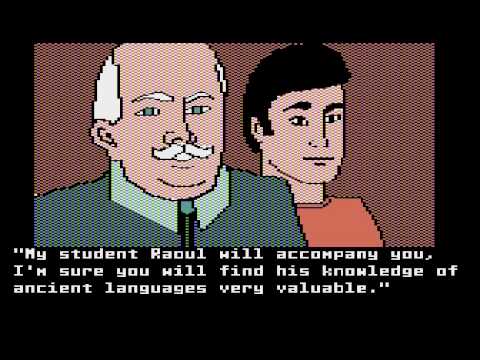
A friend of mine recently introduced me to a swathe of older text-based games, particularly 1980s Apple IIe emulation games. Of the lot, my favourite was Mask of the Sun, released in 1982. It's surprisingly sophisticated and charmingly "animated"--at one point a jaguar statue transforms into a flesh-and-blood jaguar and slinks away. We chuckled a bit to ourselves as we watched it, but all modern cynicism aside, it was a lovely effect and probably pretty impressive in its time.
It also has an interesting approach to inventory management, and some unexpected integrations of "items" and "story"--bad things happen, for instance, if you decide to drop your pills to free up space.
The story opens in medias res, and you discover your circumstances as you play: you are Mac Steele, afflicted explorer in search of a cure in the Aztec ruins of Mexico (see aforementioned pills). I played most of it imagining Mac having a torrid May-December romance with the companion character Raoul, the comely young guide sent to assist you by your contact, a Professor at a local university. This made everything even more fraught and compelling--if you play Mask of the Sun I encourage you to bring some of your own imagination to it. Because of the limitations of space and capability, there is so much room for players in these games, which is joyful.
3. Her Story
Games have a familiar vocabulary. We know what it means to press X, to pull the right trigger, to aim with the mouse, and we speak the language of levelling-up and equipping and fetch-questing. Sometimes it feels like games are a hermetically sealed space, culturally as well as in the skills and vocabulary they require. Which is why it feels like a fresh area of innovation to see games we can play the same way as we 'play' the rest of the world--games that are familiar as Googling.

So "database searching" doesn't sound like fun, exactly. But Her Story's searches through a 1990s-era database of grainy police footage in an attempt to get to the bottom of a murder actually feels dark and delightful. (And as much as I felt a glorious Windows 3.1 nostalgia, I had to turn on the Anti-Glare Filter for the sake of my modern, pampered eyes). Her Story is a murder mystery that the player has to unpick and assemble from clips of one woman, talking. If the accessibility and simplicity of database browsing feels gently innovative, then asking players to do little more than listen to a woman in an industry that is at times difficult for us, feels practically brave.
2. Summit
A confession: Emily Short asked me to do a review of one of the games in IFComp 2015, and suggested I might like Summit. I never did do that review (sorry Emily!), but she was entirely right to recommend Summit to me. It was very nearly my number one, and some days, their positions are reversed in my affections.
I've said before that Twine as a medium lends itself to conveying a sense of place, and moment, moreso than the passage of time, and space--but Summit makes me reconsider. It is atmospheric, lush, dream-like--all qualities one might expect from a Twine game--but the exceptional thing is that it also effortlessly spans years and decades without losing any of its vividness or clarity.
There is beauty and purpose to be found in each fantastical place in the game, but also an underlying desolation, a bittersweetness that comes through Phantom Williams' prose in combination with Ben Wasserman's music. (You must play it with the sound up.) But the most telling choice in Summit is to linger in these places--learning arts, making connections--or to leave, and continue on your quest to reach the elusive, ever-distant Summit. Both choices feel equally valid, equally terrible--stay and actually live life at the cost of giving up your dream, or go on with your journey but give up the people, places, magics that you are starting to know?
1. Wheels of Aurelia
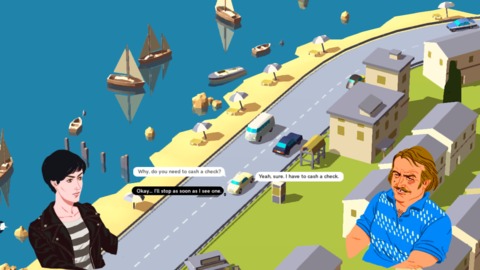
Wheels of Aurelia is part driving game, part interactive fiction. The story unfolds through conversation with people that the protagonist, Lella, picks up in her car. You choose Lella's dialogue options and drive her car along the Western Coast of Italy in the 1970s, a time of unrest and political turmoil. It's just so unexpected--a blend of "racing game" and choice-driven story--but so quietly confident in its unexpectedness. It's innovative and novel, but you forget that when you play it: it seems obvious that Wheels of Aurelia should take the shape and form that it's in, because it works so damn well. It feels assured, which is a quality I appreciate as a player.
It is a game of journey, of traversal, and each play-through is relatively short, allowing you to catch glimpses of other lives, other possibilities, before some diversion or interruption. It lends itself to being replayed, not to try and revisit particular moments or set up particular outcomes, but simply to explore the texture and atmosphere of the world.
As that implies, it is in fact a pleasing aesthetic experience, indulgently retro in its art and original soundtrack, without quite crossing the line into twee. But it's the conversations I've had that make Wheels of Aurelia my Game of the Year. The dialogue options are nuanced; Lella is a complex and irreverent protagonist, and she and her passengers discuss everything from love, sex and revolution to religion and politics and culture. The writing is politically charged but feels naturalistic; what it is, in fact, is mature, in all the best senses of the word.